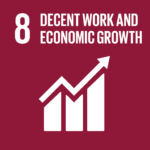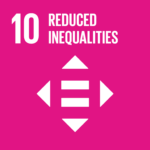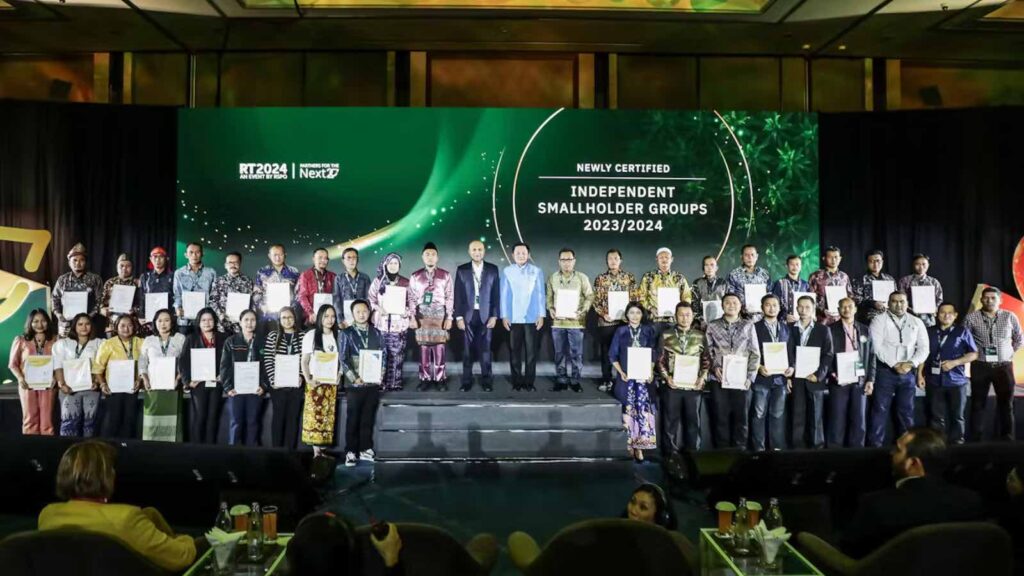RSPO is not only reshaping the palm oil industry but also setting an example for sustainable supply chains globally.
Bangkok, Thailand — At the RSPO Annual Roundtable Conference (RT2024), held from November 11 to 13 in Bangkok, the global palm oil industry committed to accelerating sustainable practices with new standards, strategic partnerships, and initiatives aimed at addressing deforestation, improving smallholder inclusion, and increasing demand for RSPO-certified products. The conference marked a pivotal moment in the sector’s transformation as the RSPO announced revised standards and ambitious goals for sustainable palm oil production.
RELEVANT SUSTAINABLE GOALS




Updated Standards to Strengthen Sustainability
The RSPO unveiled its revised 2024 Principles & Criteria (P&C) and Independent Smallholder (ISH) Standard, which aim to enhance clarity, auditability, and integration into global supply chains. These updates focus on deforestation prevention, human rights due diligence, and greater inclusion of smallholders, a critical element of the global palm oil ecosystem.
RSPO CEO Joseph D’Cruz emphasized the organization’s readiness to lead the sector into a more sustainable future: “Building on strong foundations, the RSPO is prepared for the next 20 years with fortified standards, enhanced verification systems, and a digital certification and traceability platform powered by data.”
Leveraging Partnerships for Conservation and Carbon Reduction
The conference also spotlighted new strategic partnerships to bolster the social, environmental, and economic impact of certified sustainable palm oil (CSPO) :
- MoU with High Conservation Value Network (HCVN): RSPO and HCVN renewed their collaboration to embed High Conservation Value (HCV) protections within palm oil landscapes, safeguarding ecosystems, biodiversity, and critical community areas. To date, RSPO certification has protected and restored 646,700 hectares of forests, including tropical peatlands and riparian reserves.
- MoU with Global Green Chemicals (GGC) and GIZ: The partnership aims to integrate climate-smart practices into RSPO certification through the Sustainable Palm Oil Production and Procurement Project (SPOPP CLIMA), funded by GGC. The initiative includes tools for measuring and reducing carbon footprints, training for farmers, and demonstration plots for low-carbon farming techniques, with a target of 20% emission reduction by 2030 and net zero by 2050.
“By prioritizing conservation values as an integral part of sustainable palm oil production, we aim to set clearer benchmarks for stewardship across the sector,” said Belinda Bowling, Global Director of HCVN.
Supporting Smallholders and Driving Global Demand
Smallholders, who account for 85% of Thailand’s palm oil production area, remain a focal point for RSPO. Certification among independent smallholders rose to over 40,000 globally in 2023, with Thailand leading the way in gender inclusion, as 42% of certified smallholders are women—significantly above the global average of 28%.
To further promote smallholder participation, RSPO downstream members purchased 261,792 ISH Credits, benefiting 85 certified ISH groups with $7 million in revenue.
Global production and consumption of CSPO reached new heights in 2023. Certified palm oil production grew 4.3% year-on-year to 16.1 million metric tons, while consumption rose 7.2% to 9.8 million metric tons. The RSPO Shared Responsibility Framework, which requires members to meet annual CSPO uptake targets, has supported this growth, with more than half of applicable members achieving their goals in 2023.
China’s role as a growing consumer of sustainable palm oil also featured prominently at RT2024. Inner Mongolia Yili Industrial Group, one of the world’s largest dairy producers, and Yihai Kerry, a leading Chinese palm oil trader, facilitated the first shipment of RSPO-certified sustainable palm oil into China, totaling 750 metric tons. Yili Group also signed additional agreements with global traders Bunge and Cargill to strengthen its commitment to a green palm oil supply chain.
Growth in Certified Sustainable Palm Oild
As the world’s third-largest palm oil producer, Thailand hosted RT2024 with a focus on its contributions to sustainable palm oil. Inspector-General Dr. Taworn Thunjai highlighted the importance of smallholders in the industry and praised the RSPO’s efforts to integrate climate-smart practices.
Looking ahead, the RSPO’s commitment to addressing deforestation, driving certification growth, and fostering global partnerships underscores its ambition to lead the palm oil sector toward a sustainable future in line with the 2030 United Nations Sustainable Development Goals.
“With fortified standards and transformative partnerships, RSPO is not only reshaping the palm oil industry but also setting an example for sustainable supply chains globally,” said D’Cruz in his closing remarks.
The conference concluded with a shared vision of sustainability, equity, and resilience in palm oil production, sending a strong message that the industry is ready to meet the challenges of the next two decades.
Lead image courtesy of RSPO
You may also be interested in :
Thai Palm Oi Smallholders Boost Production And Income Through RSPO Certification




